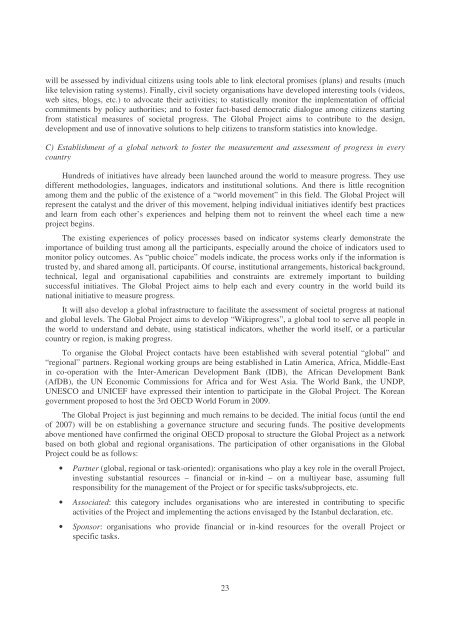Measuring Well-being and Societal Progress - Beyond GDP
Measuring Well-being and Societal Progress - Beyond GDP
Measuring Well-being and Societal Progress - Beyond GDP
Create successful ePaper yourself
Turn your PDF publications into a flip-book with our unique Google optimized e-Paper software.
will be assessed by individual citizens using tools able to link electoral promises (plans) <strong>and</strong> results (muchlike television rating systems). Finally, civil society organisations have developed interesting tools (videos,web sites, blogs, etc.) to advocate their activities; to statistically monitor the implementation of officialcommitments by policy authorities; <strong>and</strong> to foster fact-based democratic dialogue among citizens startingfrom statistical measures of societal progress. The Global Project aims to contribute to the design,development <strong>and</strong> use of innovative solutions to help citizens to transform statistics into knowledge.C) Establishment of a global network to foster the measurement <strong>and</strong> assessment of progress in everycountryHundreds of initiatives have already been launched around the world to measure progress. They usedifferent methodologies, languages, indicators <strong>and</strong> institutional solutions. And there is little recognitionamong them <strong>and</strong> the public of the existence of a “world movement” in this field. The Global Project willrepresent the catalyst <strong>and</strong> the driver of this movement, helping individual initiatives identify best practices<strong>and</strong> learn from each other’s experiences <strong>and</strong> helping them not to reinvent the wheel each time a newproject begins.The existing experiences of policy processes based on indicator systems clearly demonstrate theimportance of building trust among all the participants, especially around the choice of indicators used tomonitor policy outcomes. As “public choice” models indicate, the process works only if the information istrusted by, <strong>and</strong> shared among all, participants. Of course, institutional arrangements, historical background,technical, legal <strong>and</strong> organisational capabilities <strong>and</strong> constraints are extremely important to buildingsuccessful initiatives. The Global Project aims to help each <strong>and</strong> every country in the world build itsnational initiative to measure progress.It will also develop a global infrastructure to facilitate the assessment of societal progress at national<strong>and</strong> global levels. The Global Project aims to develop “Wikiprogress”, a global tool to serve all people inthe world to underst<strong>and</strong> <strong>and</strong> debate, using statistical indicators, whether the world itself, or a particularcountry or region, is making progress.To organise the Global Project contacts have been established with several potential “global” <strong>and</strong>“regional” partners. Regional working groups are <strong>being</strong> established in Latin America, Africa, Middle-Eastin co-operation with the Inter-American Development Bank (IDB), the African Development Bank(AfDB), the UN Economic Commissions for Africa <strong>and</strong> for West Asia. The World Bank, the UNDP,UNESCO <strong>and</strong> UNICEF have expressed their intention to participate in the Global Project. The Koreangovernment proposed to host the 3rd OECD World Forum in 2009.The Global Project is just beginning <strong>and</strong> much remains to be decided. The initial focus (until the endof 2007) will be on establishing a governance structure <strong>and</strong> securing funds. The positive developmentsabove mentioned have confirmed the original OECD proposal to structure the Global Project as a networkbased on both global <strong>and</strong> regional organisations. The participation of other organisations in the GlobalProject could be as follows:• Partner (global, regional or task-oriented): organisations who play a key role in the overall Project,investing substantial resources – financial or in-kind – on a multiyear base, assuming fullresponsibility for the management of the Project or for specific tasks/subprojects, etc.• Associated: this category includes organisations who are interested in contributing to specificactivities of the Project <strong>and</strong> implementing the actions envisaged by the Istanbul declaration, etc.• Sponsor: organisations who provide financial or in-kind resources for the overall Project orspecific tasks.23














